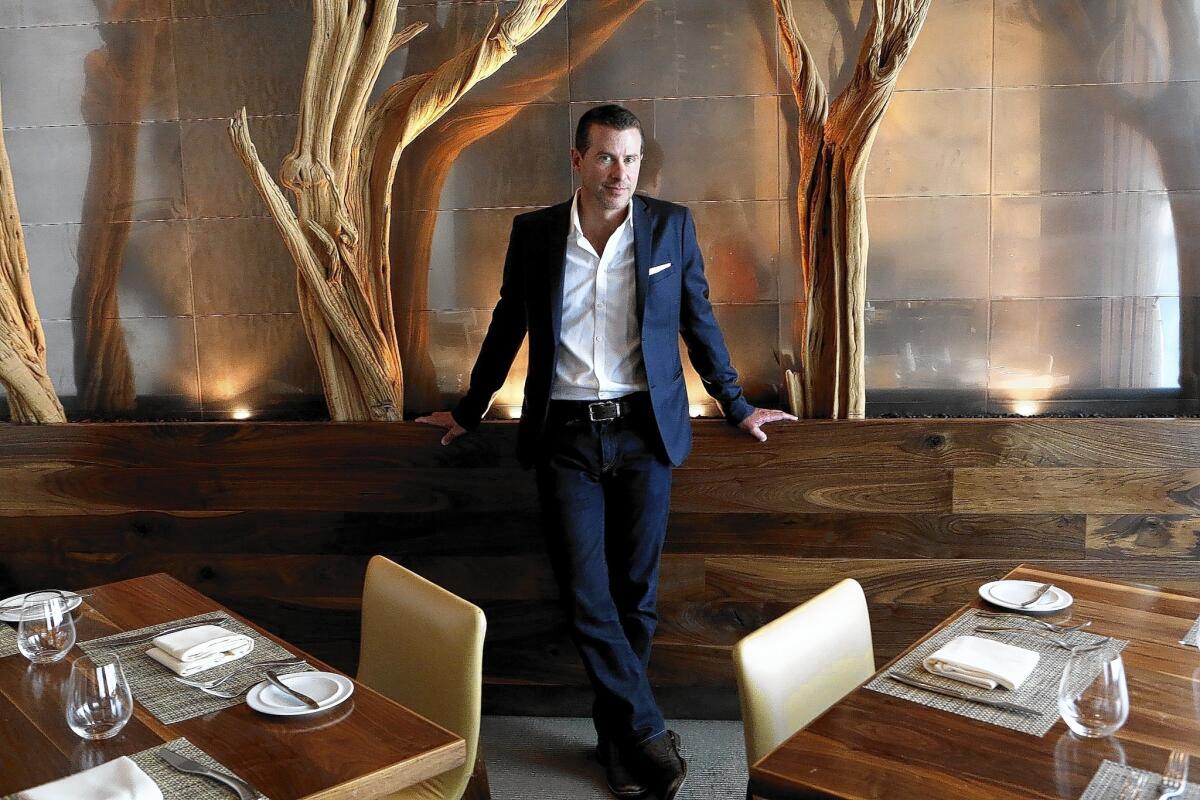How I Made It: Lee Maen’s passion is dishing up new restaurants

The gig: Lee Maen, 46, is one of the founding partners of Innovative Dining Group and helped create some of the most popular restaurants and lounges in Los Angeles, including Boa Steakhouse, Sushi Roku and Katana. Maen opened his first restaurant, Sushi Roku Hollywood, six months after graduating with his MBA from UCLA’s Anderson School of Management. IDG now has 15 restaurants, and just took its first dive into international waters with the recent opening of Boa Steakhouse in Abu Dhabi.
All in the gut: Maen bused tables in high school and put himself through college working in restaurants. Years of sprinting through kitchens, taking orders and wiping tables led Maen to vow he would never own one. But after working as a promoter for concerts and events, and owning a nightclub on Melrose Avenue with partners, he knew something was missing. Maen found no satisfaction running nightclubs and didn’t want to settle into the finance grind like most of his classmates. He wanted to cater to people but within a social scene. “My gut kept telling me — sushi bar,” he said. “So I took a chance.”
Sushi 2.0: Growing up along L.A. beaches, Maen knew the value Angelenos placed on their favorite sushi restaurants. Sushi bars, whether in strip malls or high-end locations, were always packed. But, he said, sushi bars in the 1990s had no atmosphere. “No one had melded together the great taste of sushi with a fun, social experience,” he said. In 1997, Maen and a few friends had the idea to combine the taste of “your favorite, legit, strip-mall sushi bar” with a savvy, lounge-like look to create a “dining experience.” No one had really tried that yet, Maen said, noting that IDG was the first in Los Angeles to offer a full bar in a Japanese restaurant.
A taste for space: Although he runs restaurants, Maen said his true passion is design, searching for new locations and architecture. He dabbled in real estate as a commercial broker after graduating from college. “I love figuring out what a restaurant is going to look like,” he said, gesturing to Boa’s open, sprawling patio on Sunset Boulevard, decorated with sweeping, pale-leather booths, wooden accents and fireplaces flanked by small gardens. “Most of the time I see a location and then think about the kind of restaurant I want to put there.” Restaurants in L.A. now have to have more than great food, Maen said. “Exceptional service is a must, but it’s also about the decor, vibe and how a restaurant makes you feel.”
Not going Hollywood: IDG operates some standout Hollywood restaurants and lounges, but Maen said he prefers to blend in. “I love that no one notices me when I am walking around,” he said. Many lose themselves trying to make it in Hollywood, and so much of it “is just BS,” he said. Maen spends little of his time in his restaurants, preferring instead to stay at home, travel or work in IDG’s West Hollywood offices. “You have to be well-rounded and escape, otherwise it changes you,” he said.
A new frontier: When Maen entered the business, the L.A. restaurant scene was much quieter, and review sites such as Yelp and Urbanspoon were far from their first digital glimmers. Now, L.A. rivals New York for culinary action, and anyone with a smartphone can review a restaurant for millions of readers. “I’ve had to learn how to deal with an increasingly competitive landscape and being on social media.” He still reads every review, and yes, even after 20-plus years in the business, the negative ones still hurt.
With such a crowded field for L.A. restaurateurs, IDG always has to be one step ahead. Maen is constantly thinking up new venues and how each one can be hip and different yet timeless. Maen said the competition can be scary, but it makes him push harder. “L.A. is on fire. So every night is like showtime for us,” nodding toward the bustling steakhouse. “It’s like putting on a play and everyone’s a critic.”
The next course: Newport Beach, San Francisco, New York. Maen is seeking to put down roots in new cities, but he’s taking his time. “There are very few great locations,” he said, adding that IDG is so successful because each venue gives off a different vibe yet can cater to a diverse crowd. “You have to make sure that celebrities, billionaires, secretaries, young people can all eat there and have a good time.” It’s extremely difficult to set up a restaurant, put the right things in place, step back and “let people make it their own.”
Start small, play big: Maen doesn’t envy the new guys on the block, pouring everything they have into their restaurants to make them successful. His advice: wade in. “You might have a grandiose vision, and that’s important, but fulfill that vision over time.” The IDG empire stems from one unassuming, 3,000-square-foot sushi bar. “We had a little office, one employee and we killed ourselves 24/7,” he said with a chuckle. “But we weren’t trying to hit a home run yet. We were happy with a double.”
More to Read
Inside the business of entertainment
The Wide Shot brings you news, analysis and insights on everything from streaming wars to production — and what it all means for the future.
You may occasionally receive promotional content from the Los Angeles Times.










